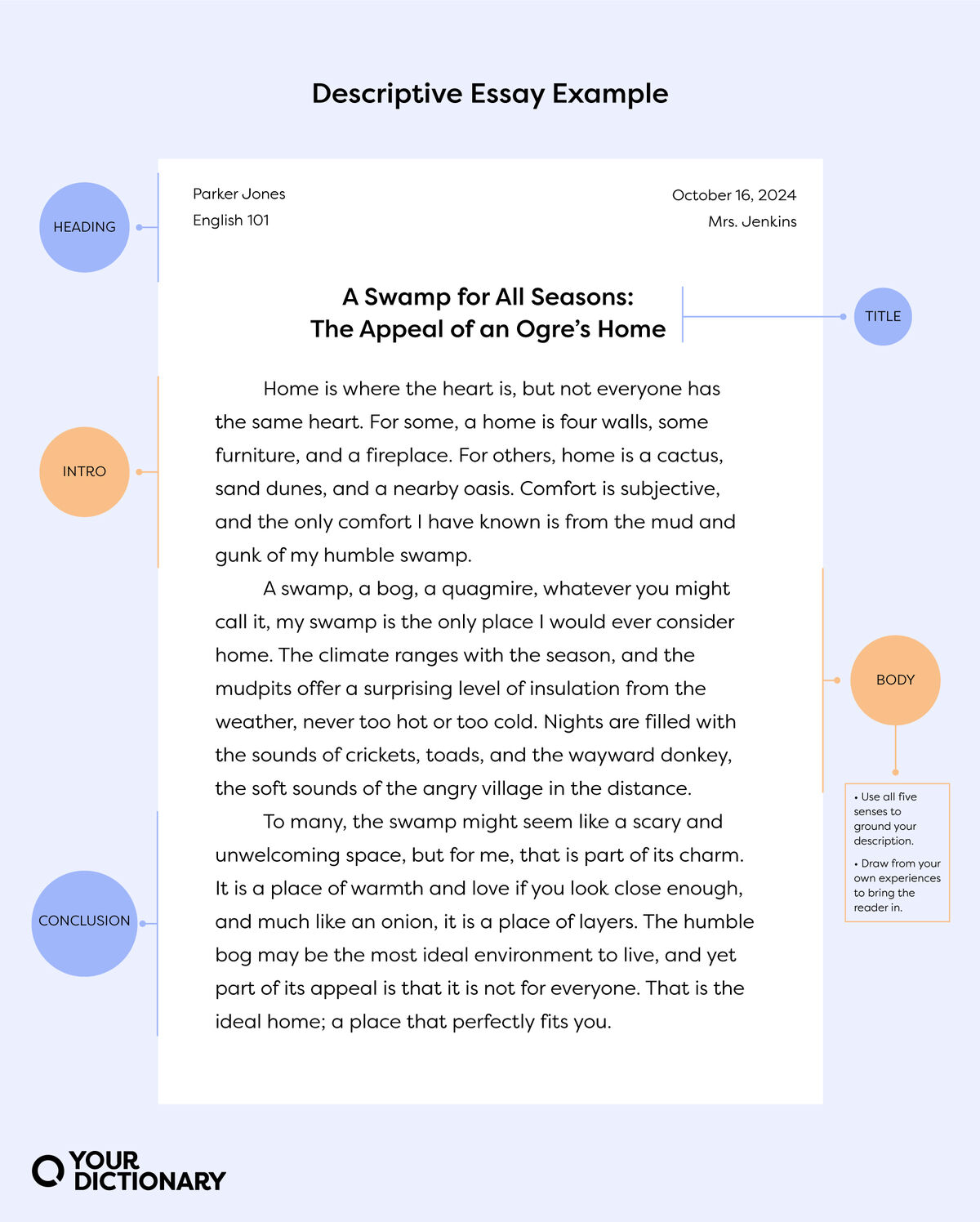
Have you ever had a really delicious cookie? Just the most perfectly balanced sweetness with chunks of melty chocolate and a little salt to bring it all together? And have you described it to a friend, family member, or curious stranger? If you’re nodding your head, you have already partaken in the writing tradition known as the descriptive essay (at least a little bit). With some polishing and tightening up, you can turn that description of a baked good into an award-winning piece of writing.
What Is a Descriptive Essay?
A descriptive essay is sort of what it says on the tin. It’s a type of essay that involves describing a person or object, though it can really extend to any sort of noun, like a place, event, experience, or emotion. If you think that seems pretty broad, you’re right. You’re technically describing something in every essay.
What makes the descriptive essay notable is that focus on description — the details, colors, feelings, sights, and sounds. Some descriptive essays might have a slight argument in their theses, but it’s not really a requirement. Your thesis statement could be as simple as “I had a cookie that changed my entire life.”
You can think of “descriptive essay” as more of an umbrella category. It can encompass other essay types, particularly analytical essays, expository essays, and personal narrative essays.
Ideas for Descriptive Essay Topics
Truly, the hardest part of descriptive essays is coming up with a topic. You really do have your entire world to potentially write about, which is understandably daunting for anyone.
Just remember that you can quite literally describe anything as long as you yourself find it interesting enough to write about. That might include:
- A long nature hike through beautiful surroundings
- Your favorite sport or a specific game/match that was memorable
- Your most recent birthday and all the things that have shaped you in the past
- A country or city, broken down into geography, climate, politics, religion, and culture
- A historical event, including its causes, ramifications, and consequences
- A news story that includes context about the people involved, information about where it occurred, and insight into other events it links to
General Format and Structure of a Descriptive Essay
There isn’t a set format for descriptive essays. A lot of it really comes down to the subject that you’re describing and your own approach to how you experience things, and it turns out that we all experience and see things differently.
A good outline structure that you can start with might look like this.
- Introduction
- Write a hook that helps your reader relate to the senses you’re tapping into.
- Provide some general background about the thing you’re describing.
- Form a thesis statement that makes a claim (but may not necessarily include an argument or opinion).
- Body paragraph: Physical Description
- Provide a topic sentence introducing the subject.
- Give an in-depth physical description of the subject.
- Body paragraph: Contextual Description
- Describe your subject within its given context, like its physical surroundings or temporal environment.
- Body paragraph: Emotional Description
- Describe how the subject emotionally or mentally affected those who interacted or experienced it.
- Conclusion
- Restate your thesis about the subject’s description.
- Consider the subject (and its description) outside of what you’ve already mentioned in the essay. How might it apply to other people or society at large?
Obviously, if you have a different angle, go with that. For example, if you’re going more for a personal essay, the structure might have more of a narrative (beginning, middle, end) format.
Descriptive Essay Examples
With a better understanding of how to approach a descriptive essay, you’re ready to prosper and write an essay of your own. We can’t write your essay for you because we don’t know your subject, but you will absolutely have more interesting and insightful descriptions than us. However, if you need some tips for writing descriptive essays, we can give you a descriptive essay example to guide your way.

Example of a Descriptive Essay Introduction
Your introduction exists to provide a little background context for your essay. What’s difficult with a descriptive essay is that you want your introduction to intrigue without giving away too much of your description (that’s what the body of your essay is for).
Home is where the heart is, but not everyone has the same heart. For some, a home is four walls, some furniture, and a fireplace. For others, home is a cactus, sand dunes, and a nearby oasis. Comfort is subjective, and the only comfort I have known is from the mud and gunk of my humble swamp.
Sample Body Paragraph for a Descriptive Essay
Unlike with other essay forms, you do not have to worry about providing evidence. You obviously can if you think it’ll help you with your description, but it’s largely about you and your experience of the subject. Outside evidence is purely secondary at that point.
A swamp, a bog, a quagmire, whatever you might call it, my swamp is the only place I would ever consider home. The climate ranges with the season, and the mud pits offer a surprising level of insulation from the weather, never too hot or too cold. Nights are filled with the sounds of crickets, toads, and the wayward donkey, the soft sounds of the angry village in the distance.
Descriptive Essay Conclusion Example
The crux of your descriptive essay will feel mostly concrete as it focuses on the subject at hand and your experience of it through the five senses. The conclusion is where you can go outside of that, and expand outward to include larger ideas and themes. In fact, if you really wanted, you could use the conclusion to essentially create an opinion or argument that could become the thesis for an entirely different essay.
To many, the swamp might seem like a scary and unwelcoming space, but for me, that is part of its charm. It is a place of warmth and love if you look close enough, and much like an onion, it is a place of layers. The humble bog may be the most ideal environment to live, and yet part of its appeal is that it is not for everyone. That is the ideal home; a place that perfectly fits you.